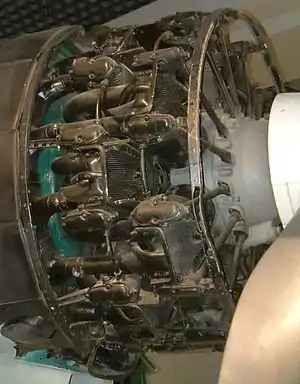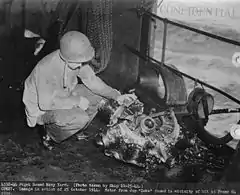Nakajima Sakae
The Nakajima Sakae (栄, Prosperity) was a two-row, 14-cylinder air-cooled radial engine used in a number of combat aircraft of the Imperial Japanese Navy and Imperial Japanese Army before and during World War II.[1]
| Sakae | |
|---|---|
 | |
| Nakajima Sakae engine on a Mitsubishi Zero | |
| Type | Piston aircraft engine |
| Manufacturer | Nakajima |
| First run | 1939 |
| Major applications | Mitsubishi A6M Nakajima Ki-43 Kawasaki Ki-48 |
| Number built | 30,233 |
| Developed from | Nakajima Ha5 |
Design and development
The engine was designed by Nakajima Aircraft Company with code name NAM, as a scaled-down and advanced version of the previous NAL design (Army Type 97 850 hp radial engine, Nakajima Ha5).[2] The Imperial Japanese Army Air Force called the first of the series the Ha25 (ハ25) and later versions were designated Ha105 and Ha115, in the Hatsudoki designation system and Ha-35 in the unified designation system, while the Imperial Japanese Navy Air Service designation was Nakajima NK1, with sub-types identified by Model numbers; thus Nakajima NK1 Sakae 10, 20 and 30 series.
A total of 21,166 were made by Nakajima; 9,067 were manufactured by other firms.
Variants
- Army Type 99 975 hp Air-cooled Radial
- Long Army designation for the Nakajima NK1 radial engine named Sakae.
- Nakajima Ha25 (Hatsudoki designation)
- Short Army designation for the initial production version of the Nakajima NK1 radial engine named Sakae.
- Nakajima Ha105 (Hatsudoki designation)
- Nakajima Ha115 (Hatsudoki designation)
- Nakajima Ha115-I
- Nakajima Ha115-II
- Nakajima Ha-35 (unified designation)
- Nakajima Ha-35 Model 11
- Nakajima Ha-35 Model 12
- Nakajima Ha-35 Model 23 - 1,150 hp (858 kW)
- Nakajima NK1 {Navy designation)
- NK1C Sakae 12 - 925 hp (690 kW), 940 hp (701 kW), 975 hp (727 kW)
- NK1D Sakae 11 - 970 hp (723 kW), 985 hp (735 kW)
- NK1F Sakae 21 - 1,115 hp (831 kW), 1,130 hp (843 kW)
- NK1E Sakae 31 - 1,130 hp (843 kW), boosted to 1,210 hp (902 kW) with water-methanol injection
Applications
Surviving engines
A small number of original Sakae powerplants are on display in aviation museums, usually mounted into the airframes of restored Mitsubishi A6M Zeros - only one airworthy Zero worldwide still flies with a restored Sakae powerplant, the Planes of Fame Museum's A6M5 example, bearing tail number "61-120".[3][4]
Specifications (Sakae 21)

Data from TAIC Manual [5]
General characteristics
- Type: 14-cylinder air-cooled two-row radial engine
- Bore: 130 mm (5.1 in)
- Stroke: 150 mm (5.9 in)
- Displacement: 27.9 L (1,687 in³)
- Length: 1,600 mm (63 in)
- Diameter: 1,150 mm (45 in)
- Dry weight: 590 kg (1,300 lb)
Components
- Valvetrain: Overhead valve
- Supercharger: Gear driven, two speed.
- Fuel system: 2 BBL D.D. Float Carb. automatic mixture and boost control.
- Fuel type: 92 Octane
- Cooling system: Air-cooled
Performance
- Power output: 842.64 kW (1130hp) at altitude
- Specific power: 30.2 kW/L (0.66 hp/in³)
- Compression ratio: 7:1
- Power-to-weight ratio: 1.428 kW/kg (0.869 hp/lb)
See also
Comparable engines
- BMW 801
- Bristol Hercules
- Bristol Taurus
- Pratt & Whitney R-1830
- Fiat A.74
- Gnome-Rhône 14N
- Mitsubishi Kinsei
- Piaggio P.XI
- Piaggio P.XIX
- Shvetsov ASh-82
- Tumansky M-88
Related lists
References
Notes
- Gunston 1989, p.105.
- Nakagawa, Ryōichi (1985). Engine History of Nakajima Aircraft. Tōkyō: Kantōsha. pp. 76–85. ISBN 4-87357-007-7.
- Seaman, Richard. "Aircraft air shows." richard-seaman.com. Retrieved: 13 October 2010.
- Flight Demo of Genuine Japanese Zero with ORIGINAL WWII Sakae 31 Engine!. YouTube. 2009. Event occurs at 2:10. Retrieved May 6, 2013.
- OPNAV-16-VT#301, p. 852
Bibliography
- Goodwin, Mike & Starkings, Peter (2017). Japanese Aero-Engines 1910-1945. Sandomierz, Poland: MMPBooks. ISBN 978-83-65281-32-6.
- Gunston, Bill. World Encyclopedia of Aero Engines. Cambridge, England. Patrick Stephens Limited, 1989. ISBN 1-85260-163-9
- Jane's Fighting Aircraft of World War II. London. Studio Editions Ltd, 1989. ISBN 0-517-67964-7
- Peattie, Mark R., Sunburst: The Rise of Japanese Naval Air Power 1909-1941, Annapolis, Maryland: Naval Institute Press, 2001, ISBN 1-55750-432-6
External links
| Wikimedia Commons has media related to Nakajima Sakae. |